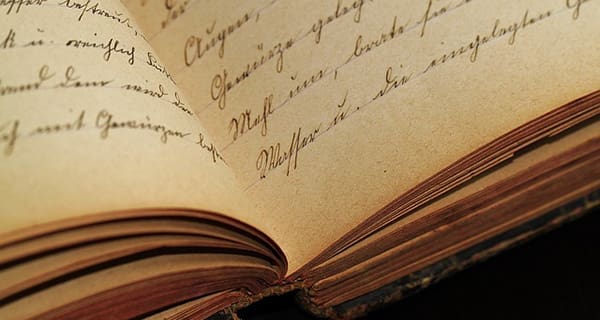 I once worked with a man who took everything slowly. His coffee. His work. Even stuffing an envelope took a day and a half. It had to be just so.
I once worked with a man who took everything slowly. His coffee. His work. Even stuffing an envelope took a day and a half. It had to be just so.
The man’s excruciating deliberateness in everything was annoying and seemingly pointless – except when it came to his handwriting. He carved museum pieces with his pen, setting his words on perfectly straight invisible lines, drawing each letter with a draughtsman’s precision, sending the line soaring, curving, diving across the page like a maestro’s baton marking music in the air.
He might need 20 minutes to write an address on an envelope but what he produced was fine art.
As handwriting goes, mine is pretty awful. It was never very good, but in the last decade, as I’ve spent more time writing on a keyboard and less time writing letters and journaling, my penmanship has degraded to something that looks like those jarring squiggles that leap from Spider-Man’s head when he senses danger.
I know I’m not alone. I encounter students who never learned cursive – schools in many jurisdictions have placed their faith in laptops and phased out the archaic practice. And I know of some children who can’t read cursive.
In fact, I might be falling into that category as well. I had a dark moment on a Saturday afternoon not long ago. I was trying to decipher a line I had written in a notebook and couldn’t.
The experience of not being able to read my note to myself was alienating. I looked at the note and wondered who had written it. Logically, I knew I had written it. I remembered writing it. But as I looked at the tangles of ink, I knew there was no way I had written it. Perhaps I had been possessed. Was I writing in tongues?
The experience annoyed me, too. I had not woken in the middle of the night and scribbled the solution to all my problems while in a fog. No, I had sat down at my desk, opened my notebook, and wrote down – deliberately but quickly – something that seemed to me at the time important enough to preserve for later. Later, meaning a moment when I had more time.
What, if anything, does bad handwriting say about a person? Is it like wearing a wrinkled dress shirt to a wedding? Or is it more offensive, like a rude shoving on the subway platform?
Illegible handwriting could suggest an off-putting personality. But more likely, the bad hand signifies an uninterested hand. A sad scrawl says: I don’t have time to make this legible for you, my dear reader. I wish I could say that great discoveries have consumed my time, but the truth is that I’m simply in a rush.
My old colleague was never rushed. I can’t say if he was a happier man than I am, but he did take pleasure in his longhand in the same way he took pleasure in aligning the books and papers on his desk into obsessively careful rows. But his desk was better kept than mine and his hand brought out my envy.
When I see these words of mine typed so neatly, so legibly, I know I need to rehabilitate my penmanship. I will begin with the ergonomics. I will hold my pen like a writer laying down ink and not like dental hygienist obliterating plaque with a pick.
Now I know what to say when somebody asks me to decipher my handwriting.
What does my handwriting say?
It says, “Slow down.”
Robert Price lectures at the University of Toronto Mississauga.
The views, opinions and positions expressed by columnists and contributors are the author’s alone. They do not inherently or expressly reflect the views, opinions and/or positions of our publication.

